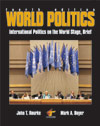"North Korea has historically been isolated, heavily armed, and hostile to Western interests. It has developed a capability to produce short- and medium-range missiles, chemical weapons and possibly biological weapons. Though its nuclear weapon program has been suspended, uncertainties continue about the implementation of the so-called Agreed Framework, including whether or not North Korea will allow full international inspections of its nuclear facilities. Pyongyang's pledge to suspend missile flight-testing until 2003 has reduced tensions on the Korean peninsula and in the region, but significant concerns remain about exports of missiles and missile technology."
From: http://www.nti.org/e_research/e1_nkorea_1.html The Agreed Framework is a document that spells out the agreement made between the United States and North Korea with reference to suspending its development of nuclear energy and replacing its graphite-moderated reactors with light-water reactor power plants. They would have a total generating capacity of approximately 2,000 MW(e) by a target date of 2003. The United States would also provide alternative energy in the form of heavy oil for heating and electricity production until the project is completed. Other issues relative to economics and politics are detailed in the document. Completed in 1994, there is growing concern that North Korea has not complied with all the terms of the agreement. For example, the International Atomic Energy Agency (IAEA) inspections conducted in May 1992 indicate that North Korea might have reprocessed enough plutonium for one or two nuclear weapons. And there is no way of knowing if and where fissionable material has been moved from the Yongbyon facility.
Added to this complexity of economic and political concerns is the fact that Japan is enforcing the repayment of a $1 billion loan that is to be used to build the new reactors. If North Korea continues to argue for an extension on the loan, observers are fearful that the time frame for delivery of the new reactor will be compromised and that North Korea will then use that argument to delay compliance with the Agreed Framework. As of March 2001, it became clear that the project will be delayed until 2010. The Bush Administration has its own concerns about the way the Framework is being handled and some within the Administration argue that a new agreement needs to be worked out. The Korean Energy Development Organization (KEDO) has recently reported its concern with the delay of the building of the light-water energy reactors. It cites that the delay will cost North Korea the loss of 2,000mw(e) from the year 2003 and demands that the United States follow through on its agreement to provide the money and material to construct the reactor by the year 2003. During the past seven years since the Agreed Framework was signed, only a ground-breaking ceremony took place as late as August 1997, and the site preparation scheduled to be finished in 14 months has been made about 95 percent, while ground work is yet to begin. North Korea is demanding that the United States live up to its agreement or it will reactivate it graphite-moderated reactors and return to nuclear energy. The Bush Administration seems reluctant to follow through with this agreement and seems to be identifying North Korea with other nuclear powers in East Asia. | 


 2002 McGraw-Hill Higher Education
2002 McGraw-Hill Higher Education